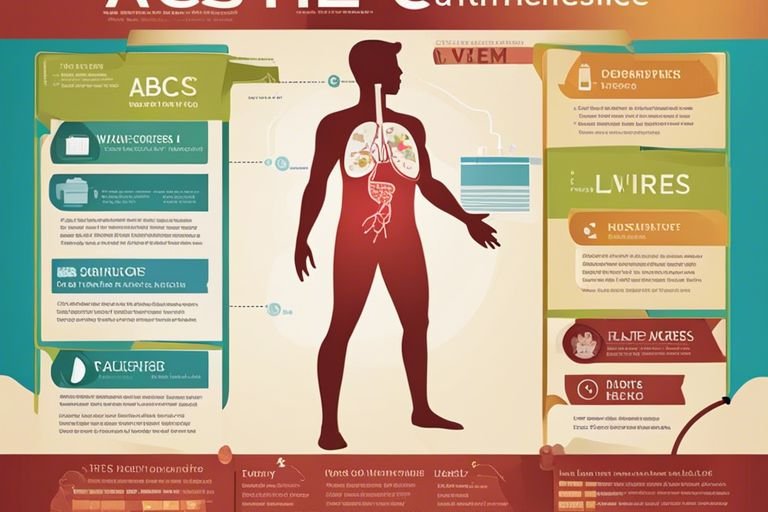Health professionals worldwide emphasize the importance of vaccination for maintaining optimal liver health. Hepatitis viruses, especially B and C, pose serious threats to liver function and overall well-being. Vaccination is a critical preventive measure that can safeguard you against these potentially devastating infections. Learn about the ABCs of liver health and why getting vaccinated is a crucial step in protecting yourself from liver-related illnesses.
Understanding the Liver
Liver Functions
An important organ in the human body, the liver plays a crucial role in maintaining overall health. It is responsible for processing nutrients from food, producing bile to aid in digestion, filtering toxins from the bloodstream, storing energy in the form of glycogen, and regulating blood clotting factors. Additionally, the liver is involved in metabolizing medications and helping the immune system fight infections.
Common Liver Diseases
An important aspect of liver health is understanding common liver diseases that can affect individuals. These include hepatitis (inflammation of the liver), fatty liver disease (accumulation of fat in the liver cells), cirrhosis (scarring of the liver tissue), and liver cancer. Hepatitis B and C are particularly concerning as they can lead to chronic infection, liver failure, and even liver cancer if left untreated.

The Basics of Hepatitis
Little What doctors wish patients knew about hepatitis A, B and C will help you understand the importance of liver health. Hepatitis is a viral infection that causes inflammation of the liver. There are different types of hepatitis, with the most common being hepatitis A, B, and C.

Types of Hepatitis
For hepatitis, there are several types that affect the liver. The most common ones are hepatitis A, B, and C. Other types include hepatitis D and E. Perceiving the differences between these types is crucial in understanding how they are transmitted and their associated risks.
| Type | Description |
| Hepatitis A | Transmitted through contaminated food or water |
| Hepatitis B | Transmitted through blood and bodily fluids |
| Hepatitis C | Transmitted through blood-to-blood contact |
| Hepatitis D | Occurs in conjunction with hepatitis B |
| Hepatitis E | Transmitted through contaminated water |
Transmission and Risk Factors
For hepatitis, transmission can occur through various means, including contaminated food or water, blood transfusions, and unprotected sex. Any direct contact with infected blood or bodily fluids can also pose a risk of transmission.
- Hepatitis A is usually spread through fecal-oral contact
- Hepatitis B and C can be transmitted through sharing needles
- Unprotected sex can lead to the transmission of hepatitis B and C
Basics of hepatitis include understanding how the virus is transmitted and the associated risks. The most important aspect is to get vaccinated against hepatitis B, as it is a preventable disease that can lead to chronic liver issues if left untreated.
The Science of Vaccination
Now, when it comes to protecting yourself against liver diseases like hepatitis, vaccination plays a crucial role. To explore deeper into this topic, I recommend reading The ABC’s of Hepatitis: What You Need to Know.
How Vaccines Work
On a basic level, vaccines work by introducing a weakened or inactive form of a virus into the body. This triggers the immune system to produce antibodies to fight off the virus. Once the immune system has developed these antibodies, it is better equipped to recognize and destroy the virus if the person is exposed to it in the future.
Benefits of Hepatitis Vaccination
For those at risk of hepatitis infection, the benefits of vaccination cannot be overstated. Vaccines are highly effective in preventing hepatitis infections, which can lead to serious liver damage, liver failure, or even liver cancer. By getting vaccinated, individuals can protect themselves from these potentially life-threatening conditions.
Additionally, vaccination also plays a crucial role in preventing the spread of hepatitis to others. By reducing the number of people infected with the virus, vaccination helps create herd immunity, further safeguarding the community against hepatitis outbreaks.
Implementing Liver Health Strategies
Lifestyle Choices for Liver Health
Many lifestyle choices can significantly impact liver health. Avoiding excessive alcohol consumption, maintaining a healthy weight through diet and exercise, and avoiding risky behaviors like sharing needles or unprotected sex can all protect your liver from damage and disease.
Vaccination as Preventative Care
For optimal liver health, vaccination against hepatitis A and B is crucial. These vaccinations are highly effective in preventing these viral infections that can cause serious liver damage. They are safe, easily accessible, and provide long-term protection against these diseases.
Liver health should not be taken lightly, as liver diseases can progress silently without presenting symptoms until significant damage has occurred. Vaccination is a powerful tool in preventing liver-related illnesses and should be prioritized as part of a comprehensive health strategy.
To wrap up
Following this read, it is crucial to understand the importance of liver health and the role vaccination plays in preventing potentially life-threatening infections such as hepatitis A and B. By keeping up with your vaccinations and adopting healthy lifestyle habits, you can significantly reduce your risk of liver disease and maintain optimal health. Take charge of your liver health today and prioritize getting vaccinated as a vital step towards overall well-being.










